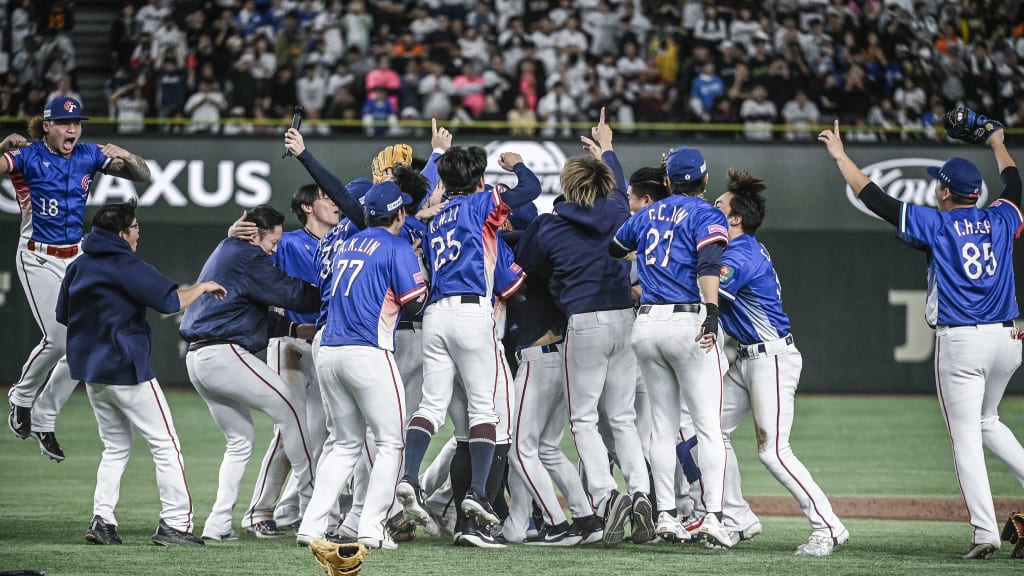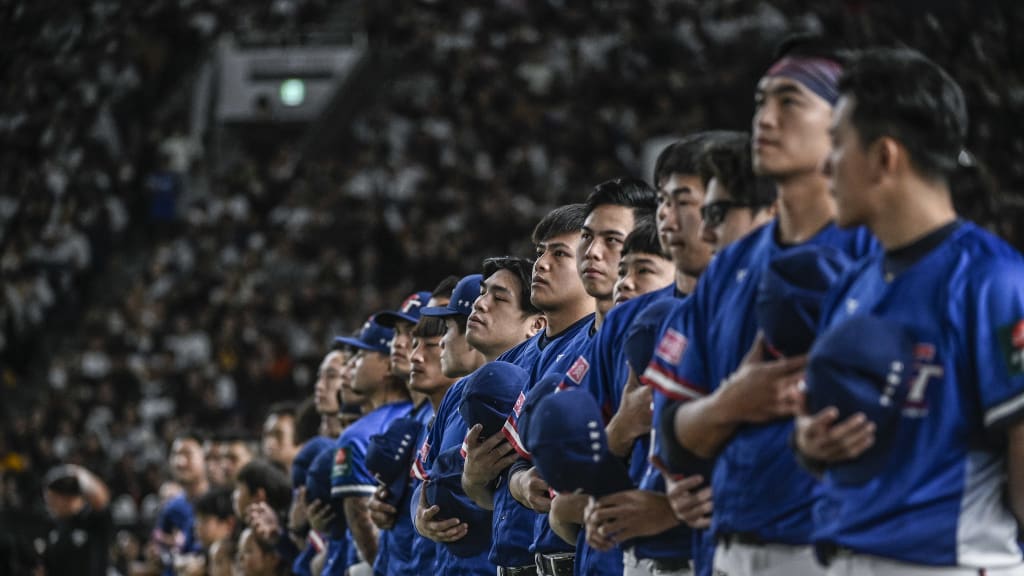
TOKYO – “We are writing our own history story,” Chinese Taipei manager Hao-Jiu Tseng said after his team upset the United States earlier this week to keep its Premier12 gold medal hopes alive. When the U.S. then defeated Venezuela on Friday, it guaranteed that Chinese Taipei would get to play in Sunday’s final against host Japan.
Even then, few believed that the team had a chance. It had never won a major international tournament at the senior level. It only advanced past the first round of the World Baseball Classic once -- in 2013 -- and were relegated to a qualifier it will host in February after finishing last in its group in 2023. It had never medaled in the Premier12, last collecting bronze in the Baseball World Cup -- this tournament’s predecessor --in 2001. The team’s best ever finish was a silver medal in the 1992 Olympics, an event held before all but three players on the roster were born.
But “there’s an infinite possibility in life,” Tseng had added that day. “You don’t know if you’re going to make it unless you try.”

Facing the powerful Samurai Japan team, which had won a remarkable 27 international games entering Sunday’s gold medal final in the Tokyo Dome, many assumed the game was already over, the gold medal already awarded. Japan's last loss came in 2019, when the United States beat them in the super-round of the Premier12.
But that possibility, seemingly infinitesimally small, came true on Sunday. Chinese Taipei's players wrote their names into the history books with a stunning 4-0 victory, holding a Japanese team that had scored at least nine runs in each of its super-round games to just four hits. Only once did Japan even put a runner in scoring position.
Japan's winning streak snapped, home fans stunned into silence, and the traveling away fans -- spread across the Tokyo Dome’s cavernous interior -- erupted with rapturous delight. This is perhaps the most remarkable upset in international baseball history.
"This event made history, and this is a meaningful moment for us all," Tseng said. "The game against Team United States, against Team Japan. We made it through to be here. What we accomplished was so big."
The victory actually started with a decision Tseng made on Friday. Japan and Chinese Taipei were scheduled to face each other in the final game of the super-round, but with their spots in the gold medal game already clinched, each team rolled out modified lineups. In Chinese Taipei’s case, it opted to skip its announced starter -- D-backs No. 7 prospect Yu-Min Lin -- and save him for the final. The choice cost the team a $2,000 fine, something its manager didn't seem to mind.
Lin made the choice seem obvious. Relying on his low-90s fastball and a darting changeup, the D-backs prospect pitched four innings, giving up just one infield single and striking out three.
"I really wanted to have a great battle against Japan in the final, that's why I made a big decision yesterday," Tseng said. "I think [Lin] did a great job, and then all the pitching staff did what they had to do to be victorious. So, I'm happy about the decision."
All of the game's scoring then came in the top of the fifth thanks to two giant home runs. Lin's fellow D-backs prospect Lyle Lin (His given name is Chia-Cheng Lin, but he goes by Lyle) started the inning with a solo home run off Japanese ace Shosei Togo.
Three batters later, with runners on first and second, captain Chieh-Hsien Chen stepped to the plate. Hitting over .600 in the tournament, there was seemingly nothing Chinese Taipei's bellwether center fielder couldn't handle. After working the count full, Chen smashed a drive deep over the center field wall. The Taipei fans went wild, the Tokyo faithful silent and slumped in their seats.
That would prove to be enough, as three relievers finished off the game, keeping Japan's powerful lineup flummoxed.
"This is really a dream come true for me, and, really, I cannot think of anything right now," Chen said after the game. "I don't have a word, but we were able to prove ourselves to the world. So, I am very thankful. To be to be victorious against a tough team is really a great moment for me."
Questions will be asked about Japan's approach to this game. Many fans and writers had expressed dismay with manager Hirozaku Ibata's lineup construction, wondering why slugger Shogu Maki was pushed down to the sixth spot in the lineup. While that happened to work when he hit the game-winning grand slam against Venezuela two days prior, this time he was left on-deck, bat on his shoulder, when Ryoya Kurihara lined into the game-ending double play.
Others will wonder why he left Togo in the game to face the red-hot Chen when the starter had already given up a home run, single and a walk before the dagger blast.
“He’s the ace of the Yomiuri Giants," Ibata said after the game. "He was also instrumental as a reliever in the World Baseball Classic. I determined that he could get out of that situation and I believed in him.”
Despite the victory, Tseng still believes Japan is ahead of his ballclub, though. They have set the standard for which international baseball teams must be measured.
"To get closer to Team Japan, that's what we really wanted to do, but we actually got a win against them," Tseng said. "That's so big. I think we got a little closer. But you know, this one win is not everything. I know they're a better team, so we need to make more effort, get even closer to the team in Japan, so that we can battle against them like that many more times to come."
Chinese Taipei will next play host to the World Baseball Classic qualifiers in February, looking to be one of the two teams among South Africa, Nicaragua and Spain that will advance to the main tournament in 2026. No matter what happens then, though, history was made. Chinese Taipei's victorious story has been written.
